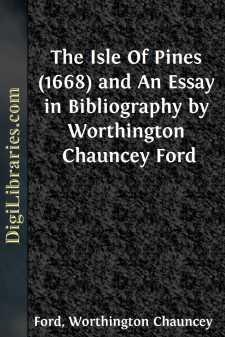Categories
- Antiques & Collectibles 13
- Architecture 36
- Art 48
- Bibles 22
- Biography & Autobiography 813
- Body, Mind & Spirit 142
- Business & Economics 28
- Children's Books 14
- Children's Fiction 11
- Computers 4
- Cooking 94
- Crafts & Hobbies 4
- Drama 346
- Education 46
- Family & Relationships 57
- Fiction 11829
- Games 19
- Gardening 17
- Health & Fitness 34
- History 1377
- House & Home 1
- Humor 147
- Juvenile Fiction 1873
- Juvenile Nonfiction 202
- Language Arts & Disciplines 88
- Law 16
- Literary Collections 686
- Literary Criticism 179
- Mathematics 13
- Medical 41
- Music 40
- Nature 179
- Non-Classifiable 1768
- Performing Arts 7
- Periodicals 1453
- Philosophy 64
- Photography 2
- Poetry 896
- Political Science 203
- Psychology 42
- Reference 154
- Religion 513
- Science 126
- Self-Help 84
- Social Science 81
- Sports & Recreation 34
- Study Aids 3
- Technology & Engineering 59
- Transportation 23
- Travel 463
- True Crime 29
The Isle Of Pines (1668) and An Essay in Bibliography by Worthington Chauncey Ford
Categories:
Description:
Excerpt
THE ISLE OF PINES
The scene opens in Cambridge, Massachusetts, in the year 1668, where in one of the college buildings a contest between two rival printers had been waged for some years. Marmaduke Johnson, a trained and experienced printer, to whose ability the Indian Bible is largely due, had ceased to be the printer of the corporation, or Society for the Propagation of the Gospel in New England, but still had a press and, what was better, a fresh outfit of type, sent over by the corporation and entrusted to the keeping of John Eliot, the Apostle. Samuel Green had become a printer, though without previous training, and was at this time printer to the college, a position of vantage against a rival, because it must have carried with it countenance from the authorities in Boston, and public printing then as now constituted an item to a press of some income and some perquisites. By seeking to marry Green's daughter before his English wife had ceased to be, Johnson had created a prejudice, public as well as private, against himself.{1}
1 Mass. Hist Soc. Proceedings, xx. 265.
Each wished to set up a press in Boston itself, but the General Court, probably for police reasons, had ordered that there should be no printing but at Cambridge, and that what was printed there should be approved by any two of four gentlemen appointed by the Court. It thus appeared that each printer possessed a certain superiority over his rival. In the matter of types Johnson was favored, as he had new types and was a trained printer; but these advantages were partially neutralized by indolence and by Green's better standing before the magistrates.{1}
In England the excesses of the printing-press during the civil war and commonwealth led to a somewhat strict though erratically applied censorship under the restoration. A publication must be licensed, and the Company of Stationers still sought, for reasons of profit, to control printers by regulating their production. The licensing agent in chief was a character of picturesque uncertainty and spasmodic action, Roger L'Estrange, half fanatic, half politician, half hack writer, in fact half in many respects and whole only in the resulting contradictions of purpose and performance. On one point he was strong—a desire to suppress unlicensed printing. So when in 1668 warrant was given to him to make search for unauthorized printing, he entered into the hunt with the zeal of a Loyola and the wishes of a Torquemada, harrying and rushing his prey and breathing threats of extreme rigor of fine, prison, pillory, and stake against the unfortunates who had neglected, in most cases because of the cost, to obtain the stamp of the licenser.{2}
New England was at this time England in little, with troubles of its own; but, having imitated the mother country in introducing supervision of the press, it also started in to investigate the printers of the colony, two in number, seeking to win a smile of approval from the foolish man on the throne. With due solemnity the inquisition was made....


